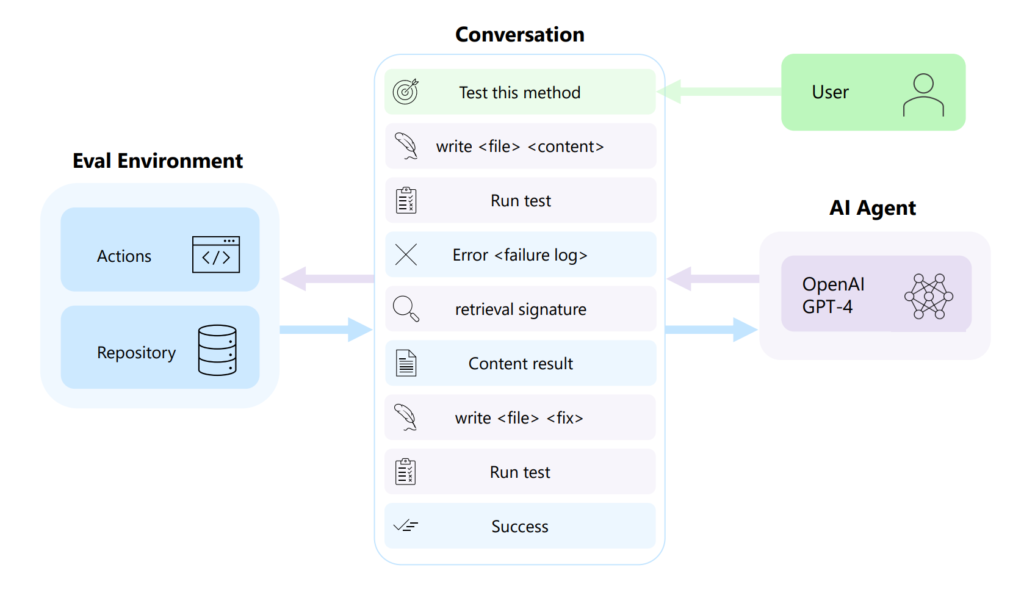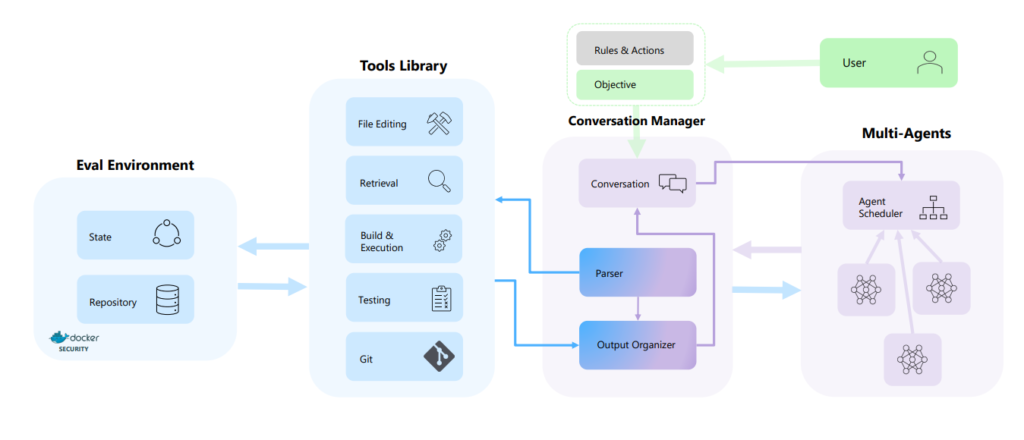
What is Microsoft AutoDev?
Microsoft AutoDev represents a paradigm shift in software development, leveraging AI to autonomously plan and execute complex engineering tasks. This framework allows developers to define objectives, which are then autonomously achieved by AI agents capable of performing a wide range of operations directly within a code repository.
The Idea Behind AutoDev and Its Evolution
AutoDev’s inception was inspired by the limitations of existing AI-powered assistants in fully leveraging IDE capabilities. Aimed at bridging this gap, AutoDev integrates deeply with software development environments, enabling a more autonomous, efficient workflow.
Technical Insights into AutoDev
At its core, AutoDev is structured around autonomous AI agents, a conversation manager, a tool library, and an evaluation environment. These components work in unison to interpret developers’ objectives, manage tasks, and execute actions within a secure, Docker-contained environment, showcasing an advanced integration of AI in software development.
How does Microsoft AutoDev Work?
At its core, AutoDev is engineered to enable a seamless interaction between users and autonomous AI agents, capable of performing a wide array of operations on a codebase. This includes, but is not limited to, file editing, retrieval, build processes, execution, testing, and git operations. What sets AutoDev apart is its architecture, meticulously designed to ensure a secure development environment. All operations are confined within Docker containers, with guardrails in place to safeguard user privacy and ensure file security. Users can define specific permitted or restricted commands and operations, tailoring the AutoDev experience to their individual needs and preferences.
The design of AutoDev is structured around several key components, each serving a distinct purpose within the framework. The Rules, Actions, and Objective Configuration is the initial stage where users specify their software engineering objectives and configure the actions AI agents are allowed to perform. This flexibility enables users to tailor the capabilities of AI agents to their project’s specific requirements, ensuring a bespoke development experience.
The Conversation Manager plays a pivotal role in tracking and managing interactions between users and AI agents. It is responsible for initiating and overseeing the conversation history, ensuring that communication flows seamlessly. This component is crucial for maintaining an organized record of actions taken and outcomes achieved during the development process.

The Agent Scheduler orchestrates the collaboration of multiple AI agents, each configured with specific roles and capabilities. This multi-agent collaboration is one of AutoDev’s standout features, allowing for a more nuanced and efficient approach to software development tasks. The scheduler ensures that each agent contributes optimally towards achieving the set objectives, employing various algorithms to manage their collaboration effectively.
The Tools Library offers a rich repository of commands and tools specifically designed for software engineering tasks. From file editing to testing and git operations, the library provides AI agents with the resources they need to execute tasks autonomously. This component abstracts the complexity of low-level commands, presenting a simplified interface for agents to interact with the codebase.
Lastly, the Evaluation Environment ensures the secure execution of tasks within a Docker container. This environment is integral to AutoDev’s design, providing a safe space for testing and validation of AI-generated code. It abstracts the intricacies of command execution, offering a streamlined process for agents to perform build, execution, and testing operations.
AutoDev’s workflow exemplifies its innovative approach to software development. A user-defined objective sets the stage for the autonomous execution of tasks by AI agents. These agents interact with the code repository, executing commands and actions directly within the repository to achieve the set objectives. The entire process is automated, requiring minimal intervention from the user beyond the initial setup.
Conclusion: A Significant Leap Forward
In conclusion, AutoDev represents a significant leap forward in the integration of AI into software development. By enabling autonomous planning and execution of software engineering tasks, it not only enhances productivity but also redefines the role of AI assistants in the development process. With its robust architecture and flexible design, AutoDev is poised to become an indispensable tool for developers, offering a glimpse into the future of software engineering.


